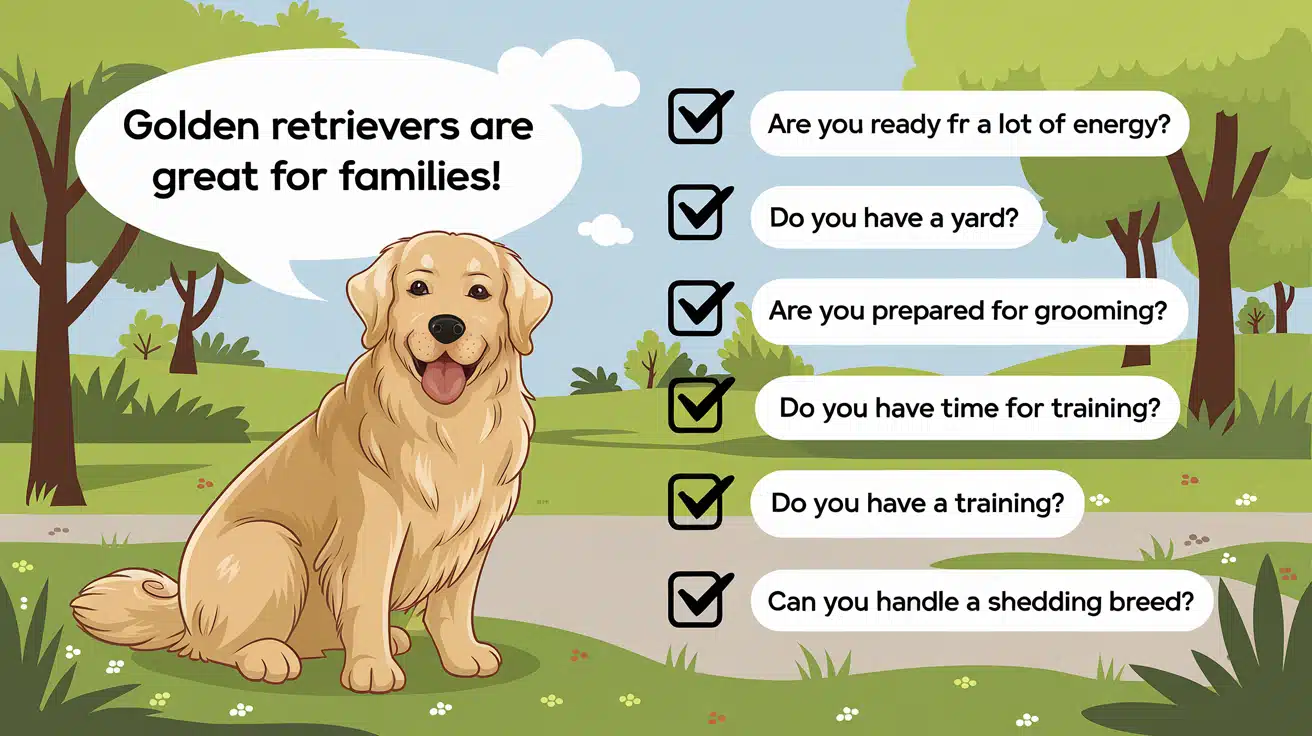5 Things to Consider Before Adopting a Golden Retriever. Bringing a Golden Retriever into your home is a significant decision that requires thoughtful consideration. These friendly and energetic dogs are known for their loyalty and affectionate nature, making them wonderful companions for individuals and families alike. Understanding the key factors to consider before adopting can help ensure a happy, healthy relationship with your new furry friend.

Imagine the joy of having a Golden Retriever greet you with a wagging tail and a loving heart every day. While their playful spirit can brighten anyone’s day, it’s crucial to match their needs with your lifestyle.
Thinking about these aspects ahead of time can save potential challenges and enrich your experience as a pet owner.
1) Exercise Needs
Golden Retrievers are high-energy dogs that need regular exercise to stay happy and healthy. If they don’t get enough activity, they might develop behavioral problems like chewing or digging.
Just like humans, exercise helps them burn off energy and stay in good spirits.
Puppies need about 15-25 minutes of exercise each day. This can include short walks or playtime in the yard.
Adult Golden Retrievers require more activity, usually between 40-120 minutes daily. Activities like long walks, running, or playing fetch are perfect for them.
It’s essential to have a plan to meet these exercise needs. A fenced yard can be very helpful, allowing them to run and play safely.
If you don’t have a yard, consider frequent trips to a dog park. These dogs love socializing, making a dog park an excellent option.
Remember, the younger the golden, the more exercise they generally need. Without enough exercise, they might become bored or restless.
This can lead to frustrating behavior for both the dog and the owner. Regular activity helps keep them mentally and physically fit, reducing the chances of problems.
Exercise also strengthens the bond between you and your dog. Engaging in activities together means more quality time and mutual enjoyment.
It’s a rewarding experience for both of you. By staying active, you ensure your Golden Retriever lives a long and healthy life.
For more detailed information, check out how much exercise a Golden Retriever needs from the Golden Retriever Society.
2) Grooming Requirements
Grooming a Golden Retriever takes time and regular effort. Their double coat needs frequent care to stay healthy and look good.
Brushing at least three times a week is necessary to remove loose hair and prevent mats.
A good brush, like an undercoat rake, helps in getting rid of excess hair. Start from the base of the hair near the skin and work your way outwards.
This simple step can make a big difference in keeping your dog’s coat clean and shiny.
Bathing a Golden Retriever should be done about once a month. Be sure to rinse the coat twice because their dense fur retains shampoo.
After bathing, towel dry your retriever and allow some time for air drying.
Checking your dog’s skin regularly is also key. Grooming time is perfect for noticing any unusual bumps, redness, or pests.
Early detection of skin issues can prevent bigger problems later on.
Don’t forget about dental care. Brush their teeth daily if possible. Though dental treats can help, nothing beats a good brushing for maintaining oral health.
Taking care of their nails is another part of grooming. Trim them once every three to four weeks to keep your dog comfortable.
Long nails can cause pain and potential injury.
Regular ear checks are essential too. Golden Retrievers are prone to ear infections due to their floppy ears. Clean their ears weekly to avoid any issues.
Consistent grooming helps your Golden Retriever stay comfortable and healthy. It’s also a great way to bond with your pet and show them you care.
3) Financial Commitment

Adopting a Golden Retriever involves more than just a one-time cost. Purebred Golden Retrievers from a breeder can range from $500 to $3,000.
On the other hand, adopting from a shelter usually costs between $200 and $500. It’s essential to budget for these initial expenses.
Once home, Golden Retrievers need basic supplies. These include a bed, leash, collar, toys, and food bowls.
Their first-year expenses can reach around $2,077 to $2,947, considering medical checks, vaccinations, and everyday care.
Regular vet visits are crucial for your dog’s health. Budget for vaccinations, flea and tick prevention, and heartworm medication.
Grooming is another regular cost. Golden Retrievers need frequent grooming because of their thick fur, which can mitigate shedding and keep them looking their best.
Training is another significant expense. Professional training can help manage their energetic nature and ensure they behave well in various situations.
This expense varies widely but is an important consideration for first-time dog owners.
Food is an ongoing cost. High-quality dog food is essential for their health and well-being.
It’s worth noting that vet bills can quickly add up if your pet has health issues. They may need surgeries or treatments from time to time.
Pet insurance might be a good option. It can help cover unexpected costs. The monthly premium depends on the plan and the dog’s age and health.
Owning a Golden Retriever can be a joyful, life-changing experience. However, prospective owners should be aware of the financial responsibilities involved.
Planning ahead and budgeting can ensure that your furry friend receives the best care possible.
4) Training and Socialization
Training and socialization are crucial for a Golden Retriever to become a well-behaved and happy member of the family.
These dogs are really smart, so they catch on quickly and want to make their owners happy. Starting training early and being consistent can make a huge difference.
Golden Retrievers can begin their training as young as 8 weeks old. Starting with basic commands like “sit,” “stay,” and “come here” lays a solid foundation.
Puppy Kindergarten classes can be really helpful, providing structured lessons and socialization opportunities.
Socializing a Golden Retriever is just as crucial as training. They need to be used to different environments, people, and other animals.
Taking them to different places, like parks or pet-friendly stores, helps them adapt and become more confident.
Potty training is another key aspect and should start as soon as the puppy comes home. Consistent routines and positive reinforcement make this process smoother.
Using treats and praise when they go outside teaches them what’s expected.
Adolescence is when training really needs to be reinforced. This is the stage where Golden Retrievers test boundaries.
Continual reinforcement of good behavior during this period is essential.
Advanced training can come later, teaching more complex commands and even tricks. Training sessions should be kept short to keep the dog’s attention. Clicker training can also be a fun and effective method.
According to the Golden Retriever Society, regular training into adulthood helps maintain good behavior.
Using a method like the Von Falconer Way, which includes exposing puppies to new objects and environments early on, can be effective. This approach helps puppies accept discipline and submission.
Remember, a well-trained and socialized Golden Retriever is not just a pet; they become a true family member.
They bring joy, love, and loyalty that enriches the lives of everyone in the household. Happy training!
5) Health Issues

Golden Retrievers are known for their friendly and loyal nature, but they can face certain health problems. It’s important to know these issues to keep your furry friend healthy and happy.
One common problem is allergies. These can cause itching and inflammation on their skin and ears. If a Golden is constantly scratching, it might be dealing with allergies.
Regular check-ups and proper care can help manage this issue.
Hip dysplasia is another concern. This is a condition where the hip joint doesn’t fit right, causing pain and difficulty in moving.
Keeping your dog at a healthy weight and providing proper exercise can ease some of the symptoms.
Golden Retrievers can also be prone to cancer, with a significant number being affected at some point.
Regular vet visits and being aware of any unusual lumps or changes in behavior can help catch cancer early. Early detection is key for better outcomes.
Heart issues might also arise in Goldens. Conditions like aortic stenosis can affect their heart function.
Paying attention to symptoms like coughing, fatigue, or difficulty breathing is important. These issues usually need vet attention and sometimes medication.
Lastly, eye conditions such as cataracts or progressive retinal atrophy can affect vision.
Regular eye check-ups can help detect these issues early, and sometimes surgery can improve or restore sight.
Understanding Golden Retriever Temperament

Golden Retrievers are known for their friendly and energetic nature. They thrive in social environments and require proper care and attention to maintain their high energy levels.
Social Nature
Golden Retrievers are incredibly social and enjoy being around people and other animals. They are known for their friendly and gentle behavior, making them wonderful family pets.
These dogs love to play and often show a lot of affection towards their owners.
Their social nature makes them ideal for families with children. They are patient and tolerant, which is a great trait for households with young kids.
However, because of their need for social interaction, they may not do well in homes where they are left alone for long periods.
For those with other pets, Golden Retrievers usually get along well. Their amiable temperament often makes introductions to new animals smoother.
It’s essential to properly socialize them early on to ensure they are comfortable and happy in various social settings.
Energy Levels
Golden Retrievers are highly energetic. They require regular exercise to keep them healthy and happy.
Activities like walking, running, and playing fetch are great ways to engage their energy. A lack of physical activity can lead to behavioral problems and obesity.
Owners should be prepared to spend quality time exercising their pet. This breed thrives in environments where they can explore and play.
Without enough stimulation, they can become bored and potentially destructive.
Their energy levels also mean they excel in various dog sports and activities. If you enjoy an active lifestyle, a Golden Retriever can be a great companion, always eager to join you on your adventures.
Home Environment Considerations

Understanding the best environment for a Golden Retriever involves evaluating factors like living space and access to the outdoors. These elements ensure that your pet remains happy and healthy.
Living Space
Golden Retrievers require ample room to move around, as they’re an energetic breed.
Apartments may not be ideal, but if it’s spacious and has a nearby park, it could work. Families with large homes and backyards can provide the freedom they crave.
Consider the layout of your home. Open spaces where a Golden can play fetch or roam, ensure mental and physical stimulation.
Additionally, having a designated area for their bed, toys, and feeding can offer comfort and routine.
Golden Retrievers can adapt to different home environments, but they thrive best in spacious settings. They’re social animals, so ensure they have easy access to family areas. This way, they never feel isolated.
Outdoor Access
Outdoor access is vital for a Golden Retriever. Daily exercise keeps them fit and prevents behavioral issues.
If you have a yard, make sure it’s secure and escape-proof, as these dogs love to explore.
For those without a yard, proximity to dog parks or open spaces where they can run is essential.
They need at least an hour of outdoor activity each day, which can be split into multiple walks or play sessions.
Golden Retrievers enjoy activities like playing fetch, swimming, or even hiking. These allow them to burn off energy and maintain their strong muscles.
Always ensure they have access to fresh water and shade during outdoor activities to prevent overheating.
Health and Care Requirements
Adopting a Golden Retriever means committing to their health and well-being. This includes ensuring they get enough exercise, maintain a balanced diet, and addressing common health issues.
Regular Exercise
Golden Retrievers need daily exercise to stay healthy and happy. They are energetic dogs that love to play, run, and fetch.
Without enough activity, they can become overweight and develop behavior problems.
A daily routine should include at least one hour of physical activity. This can be split into multiple play sessions or long walks.
Many Goldens enjoy activities like swimming and hiking, which also make great bonding opportunities.
Even if it’s raining or cold, indoor games like tug-of-war or hide and seek with treats can keep them active.
Regular training sessions can also provide mental stimulation, which is just as important as physical activity.
Dietary Needs
Feeding a Golden Retriever a balanced diet is crucial for their health. They have a hearty appetite and can easily become overweight if their food intake isn’t monitored.
Golden Retrievers benefit from high-quality dog food that lists meat as the first ingredient. Proper nutrition includes proteins, healthy fats, and complex carbohydrates.
Avoid feeding them table scraps and human food, as these can contribute to health issues.
Mealtime should have consistency in feeding schedules—twice a day works well for most adult Goldens.
Fresh water should always be available.
Paying attention to portion sizes and using feeding guidelines provided on dog food bags can help maintain their ideal weight.
Common Health Issues
Golden Retrievers are prone to certain health issues. Potential pet owners should be aware of this. Hip dysplasia and elbow dysplasia are common, often leading to arthritis.
Regular vet check-ups and maintaining a healthy weight can help manage these conditions.
This breed is also known to face heart problems, such as subvalvular aortic stenosis (SAS). Regular heart screenings can help catch issues early on.
Eye conditions like cataracts and progressive retinal atrophy can affect Goldens, so yearly eye exams are recommended.
Golden Retrievers are also prone to skin allergies, often related to food or environmental factors. Keeping them on a hypoallergenic diet and using medicated shampoos can help manage skin issues.
Early detection and treatment can improve their quality of life significantly.






